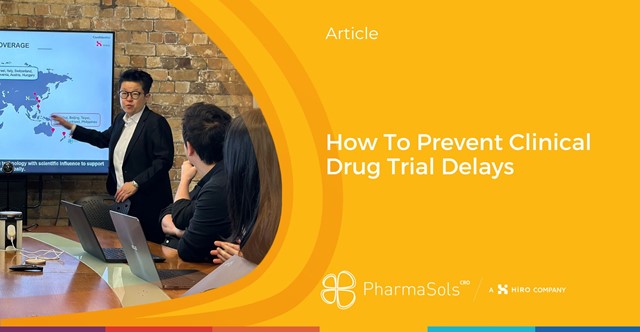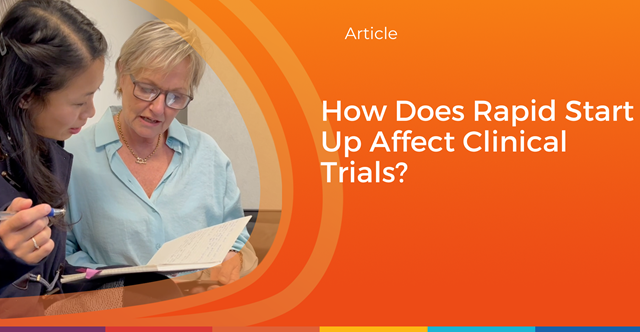14 Feb
How To Prevent Clinical Drug Trial Delays

Is your clinical drug trial getting delayed?
Delayed clinical drug trials are a thorn in the side of any study stakeholder. Increased cost, blown-out budgets, and late delivery to market can have damaging effects on the study’s overall success, not to mention the impact on the patients requiring these new medicines or devices.
But unfortunately, it’s not at all uncommon – research shows that 85% of trials are delayed².
PhRMA research determined that the average cost of a single successful drug trial sits at around $2.6 billion, with the cost per day to conduct a trial being anywhere between $600,000 and $8 million³.
Bearing those statistics and costs in mind, delays directly affect budgets, with even a few days making a significant difference.
While this may all sound discouraging, there are ways to minimise the impact of a delay, or chances of a delay in the first place.
This blog will discuss at the main causes of delayed trials, and what precautions can be taken to ensure timelines can be adhered to.
Why are clinical drug trials delayed?
Anyone who has been involved in clinical trials long enough will know that the factors most likely responsible for delays are 1) start up timelines, and 2) patient recruitment and retention.
Start up processes
Before patients are recruited, the clinical trial goes through a start up phase which includes processes like ethics and regulatory approvals, and site identification and orientation.
The faster these processes can be achieved, the more cost effective and efficient the trial will be. However, this critical yet frequently overlooked phase of a trial is most often where delays occur.
In a study conducted by Tufts, researchers found that it takes nearly eight months⁴ on average to get a study up and running. This delay can rush the rest of the trial timeline, resulting in improper site selection and further interference with patient recruitment.
Patient recruitment and retention
CROs need to recruit the right people and make sure as many of them stay the duration of the trial. Ineffective recruitment strategies prolong timelines and can introduce bias or variability.
Given that trials take six to seven years on average to complete, this is not an easy task. But failure to meet recruitment targets or to gather a diverse population pool can compromise the quality of clinical data, leading to potential rejection of the regulatory application by the FDA or EMA.
High dropout rates often result in incomplete datasets, lowering the statistical power and validity of the trial findings.
The effect on the bottom line
As already mentioned, there are many repercussions caused by delays in clinical trials, the most inevitable being increased cost.
Sponsors require that their capital investment will be used efficiently to quickly generate high quality, accurate clinical data, and secure commercialisation.
Being aware of and addressing the possible causes of delay will not only give your sponsor greater confidence, but will help ensure the success of the trial as a whole.
Clinical drug trial delays do not have to be inevitable
Partnering with the right CRO, located in an area conducive to time efficiency and effective recruitment strategies, is the number one way to ensure that your trial does not experience delays.
When looking for a CRO, consider how their location, experience and relationships with local trial sites could affect the start up and recruitment processes of your study.
The ANZ region is an ideal location for rapid start up
Australia and New Zealand (ANZ) have proven to be incredibly successful locations for clinical trials, due to this region having some of the fastest and most streamlined ethics and regulatory frameworks in the world.
ANZ does not require an Investigational New Drug Application (IND), and full Good Manufacturing Practices (GMP) material is not mandated for Phase I clinical trials. Because of this, the regulatory timeline can be shortened by up to a year, compared to the US.
Despite the rapid pace at which start up can occur, the region’s regulatory and ethical processes are of an extremely high standard, and any clinical data collected here is accepted by major regulatory bodies, such as the FDA and EMA.
This makes it an ideal location to do a rapid start up, saving invaluable time and money.
The ANZ region is an ideal location for effective recruitment
With its diverse populations and proven patient recruitment and retention rates, the ANZ region is well-placed to collect high-quality clinical data.
The Australian and New Zealand governments have taken proactive initiatives to enhance awareness and interest in clinical trials among their populations, resulting in the region having a highly informed, willing, and ethnically diverse patient population. Many patients are also keen to gain access to the most innovative new treatments available in the world.
Compared to the northern hemisphere, ANZ populations are also more willing to take part in clinical trials. According to statistics from the Australian and New Zealand Clinical Trials Registry (ANZCTR), between 2021 and 2023, ANZ managed to exceed patient recruitment expectations while achieving a participant retention rate of 104%¹.
PharmaSols can help your clinical drug trial stay on schedule
With more than 20 years’ experience in the ANZ clinical trial industry, PharmaSols understands how to leverage the advantages provided by the region, so that your trial avoids delays.
Our in-depth knowledge of the region’s effective processes mean ethics and regulatory approval and first site initiation visit can be achieved in 35 days.
We have established relationships with local communities. We understand the nuances of the ANZ region and deliver our patient recruitment, retention and diversity targets, generating high-quality data for your trial.
We also have relationships with most trial sites in Australia and New Zealand. Our knowledge of trial site experience, capabilities, facilities and historic performance enables us to complete feasibility and qualification more efficiently.
Talk to our team at PharmaSols about keeping your trial on track and within budget.
Make sure to also subscribe to our newsletter to receive regular updates and key industry insights.
¹ ANZCTR data taken 10th Jul2023, AU NZ, completed trials 2021-2023,169 trials, actual, sample size not blank.
² Facts about clinical trials. (Online) Available at: http://www.arena-international.com/clinicaltrials/facts-about-clinical-trials/1063.article (Accessed 08/03/2020)
³ https://www.gopraxis.com/news/the-real-cost-of-clinical-trials/
⁴ Accelerating Study Start-Up: The Key to Avoiding Trial Delays (Online) Available at: https://acrpnet.org/2017/02/01/accelerating-study-start-up-the-key-to-avoiding-trial-delays/ (Accessed: 08/03/2020)
Other News
March 2024 (1)
February 2024 (1)
December 2023 (1)
November 2023 (1)
October 2023 (1)
September 2023 (2)
August 2023 (1)
July 2023 (1)
June 2023 (2)
May 2023 (3)
April 2023 (1)
March 2023 (2)
The Go-to region for clinical trials (1)
HiRO – our global advantage, tailored solutions and key partnerships (1) (1)
HiRO – an emerging full-service global CRO (1)
HiRO – Top CRO in APAC 2022 (1) (1)
November 2022 (1)
October 2022 (1)
September 2022 (1)
August 2022 (1)
July 2022 (1)
June 2022 (1)
May 2022 (1)
April 2022 (1)
March 2022 (1)
January 2022 (1)
December 2021 (1)
November 2021 (1)
October 2021 (2)
September 2021 (2)
August 2021 (3)
July 2021 (3)
June 2021 (2)
May 2021 (1)
April 2021 (2)
March 2021 (1)
February 2021 (1)
December 2020 (5)
November 2020 (1)
October 2020 (5)
September 2020 (1)
August 2020 (2)
May 2020 (5)
January 2024 (0)

